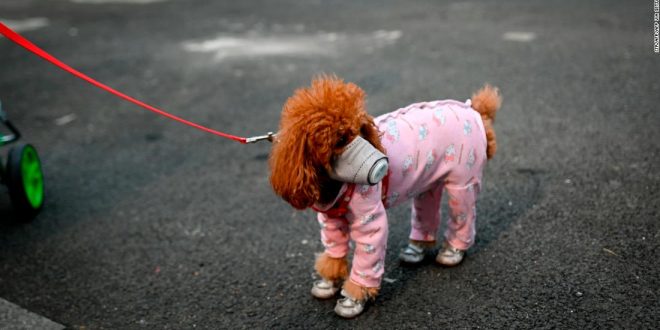They’re your furry best friend and a fixture of your home — but could your beloved dog give you coronavirus? Experts agree, almost definitely not. Why then did one dog in Hong Kong test positive for coronavirus last week?
Last Friday, Hong Kong’s Agriculture, Fisheries and Conservation Department (AFCD) said that samples from the dog’s nasal and oral cavities had tested “weakly positive” for novel coronavirus. It was believed to be the first time that a dog anywhere in the world tested positive for the virus.
The dog — which had no symptoms — was put into quarantine and will be repeatedly tested until the result comes back negative, according to the statement. The department “strongly advises” that pets of people infected with coronavirus are quarantined for 14 days.
Despite this, the AFCD and the World Health Organization both agree there is no evidence that pets such as dogs can be infected with the coronavirus. That’s because while dogs can test positive for the virus, it doesn’t necessarily mean they have been infected.
So why would a dog test positive?
We know that coronaviruses can live on surfaces and objects, although researchers don’t know exactly how long this virus can linger for. This is such a concern in mainland China that the central bank has been deep cleaning and destroying potentially infected cash.
In the same way, coronavirus could be present on the surface of a dog, even if the dog hasn’t actually contracted the virus. The AFCD is testing to see whether the dog has been infected with the virus or if it has just been contaminated with the virus.
“Present evidence suggests that dogs are no more of a risk of spreading (coronavirus) than inanimate objects such as door handles,” wrote Sheila McClelland, the founder of Hong Kong-based Lifelong Animal Protection Charity (LAP), in a letter to the Hong Kong authorities, which she shared with CNN.
McClelland said there had been no confirmed cases of dogs contracting the disease anywhere in the world, and that there are no published studies showing that the coronavirus test is accurate in dogs.
Can pets give you coronavirus?
There were similar fears over coronavirus spreading to pets during the SARS outbreak in 2003 when over 280 people died in Hong Kong. Experts believe that both SARS and Covid-19 likely originated in bats.
Dogs cats do get coronaviruses — but they are not at all the same as the virus associated with this current outbreak, said Jane Gray, Hong Kong SPCA’s chief veterinary surgeon. Those strains are a completely different type and don’t cause respiratory problems.
According to the US Centers for Disease Control and Prevention, the main way the disease is spreading is from person-to-person, either from when people are close together or from respiratory droplets when an infected person coughs and sneezes.
Is it worth quarantining pets?
According to Gray, there is still value in quarantining pets from a scientific perspective, because it allows scientists to observe how an animal relates to a disease we still know relatively little about.
“Whilst it seems a bit scary, it’s purely a precautionary measure, and it’s certainly nothing for pet owners, in general, to be concerned about,” said Gray.
Some pet owners in mainland China have been fitting their dogs with tiny face masks, but Gray said there is no benefit to that — in fact, it’s probably fairly distressing for the pet and could cause them to panic. Instead, pet owners should stick to the basics: good hygiene.
Both WHO and Gray said owners should wash their hands with soap and water after touching pets. Gray said if dog owners are particularly concerned, they can wipe their dog’s paws with antiseptic wipes after they have had a walk outside — but they should take care not to overdo it, as wiping too much can dry out a dog’s paws.
“I am certainly not in any concern of my dog, I’m far more concerned about myself catching it from a human being that has the disease,” said Gray, who is a pet owner herself.
What’s the bigger risk?
To veterinarians and animal rights experts, there is a bigger issue than the potential spread of coronavirus to pets: the spread of fear. After the announcement that the Hong Kong dog tested positive last week, the Lifelong Animal Protection Charity (LAP) — a group which helps rehome animals in Hong Kong — wrote to the government, saying its announcement caused “a tremendous amount of panic.”
McClelland, the founder of LAP, said she had been contacted by “countless people” worried for their pets, with many anxious that their dog would be forcibly sent to quarantine.
“In a state of panic, people could abandon or kill their pets,” she said. “Other people could stigmatize people who have dogs. Dog owners could face unreasonable problems when simply walking their pets outdoors, or neighbors could create trouble for no reason.”
In Wuhan — the Chinese city at the center of the epidemic and which has been under lockdown for over a month — pets have been trapped in apartments alone while their owners are stuck outside the city. Volunteers from Wuhan Small Animal Protection Association say they have rescued hundreds of pets left in apartments.
Furry Angels Haven, a group that works to rescue homeless and neglected pets in Wuhan, said that “without a doubt” there had been an increase in abandoned pets since the outbreak and that pets were being unfairly targeted.
So far, Gray and McClelland haven’t seen any sign of an increase in pet abuse or abandonment in Hong Kong. Instead, they’ve both seen an increase in people looking into steps to export their pets overseas — suggesting owners are looking to leave the city.
Why pets are worth keeping
Rather than pets being a coronavirus culprit, they are actually good to have around in this stressful period when many people are stuck working or studying from home, says Gray.
Pets are likely happy to have extra time with their owners, and can help lower people’s blood pressure and ease the feelings of stress, she said. “We know that stress lowers our immunity, and no one right now wants their immunity lowered,” she added.
That’s been the case for Hong Kong resident Marco Leung, who has a seven-year-old pet dog. He’s not worried about his dog getting sick from coronavirus — although he has been taking precautions such as cleaning his dog after walks.
“I know dogs will not be infected, but if the virus goes on their skin or fur, it will stay there. So if we are careful, I think it’s OK,” he said. He’s been working from home, so he gets to spend the whole day with his pet Hung Jai, which means “little bear” in Cantonese.
Please note: This article is not edited by Dog Express Team!

 DogExpress
DogExpress

















 in Chandigarh, India.
in Chandigarh, India. 
